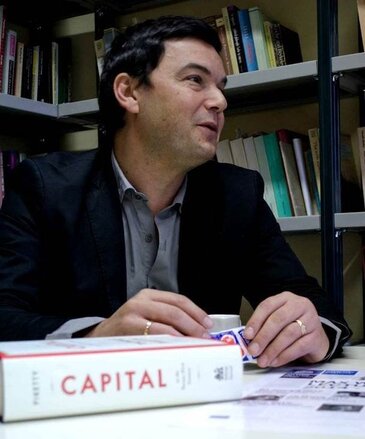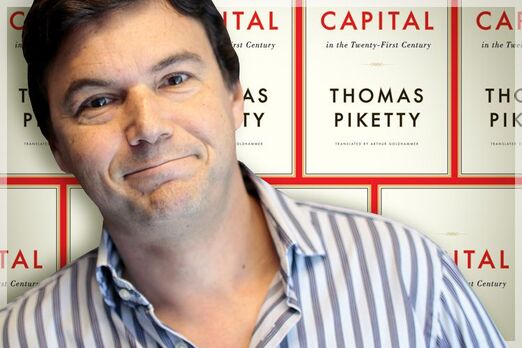|
1/21/2022 "Introduction" to Capital in the Twenty-First Century by: Thomas Piketty— Part 6. Reviewed by: Thomas Riggins (6/6)Read Now14. The Theoretical and Conceptual Framework of Piketty’s Book In this next to last section of his Introduction Piketty presents some autobiographical information that he thinks will be helpful in seeing how his views developed. This information is about his subjective emotional experiences and not at all on scientifically based views nevertheless, the information is interesting and helps to explain many of his attitudes. It is a section more about what he calls his “intellectual itinerary” than about theory, as we shall see. He tells us he turned 18 in 1989 when the Berlin Wall fell and was part of that generation who listened to the news of the fall of the Communist dictatorships and who had no affection or nostalgia for any of them including the Soviet Union. An older generation who remembered it was the Communists who ran the underground against the Nazi occupation of his country and that the Soviet Union basically single handedly defeated Hitler’s Germany (80% of the German military forces were directed against the Soviet Union— D-day was a mopping up operation) and the Soviet Union liberated most of Europe from Nazi control might have had a different reaction. But it is a characteristic of callow youth to have no historical memory. He was, at 18, he says, “vaccinated for life against the conventional but lazy rhetoric of anticapitalism….” The disease infecting young minds in Paris at the time, however, was anticommunism not anticapitalism and it appears the young Piketty got the wrong inoculation. Piketty is a firm believer in bourgeois democracy and supports a social order based on democratic debate which will provide equal justice to all under the rule of law. He appears innocent of the struggle based on class conflict aimed at ending the exploitation of working people resulting from the expropriation of their surplus labor power by a class of social parasites which has control over the means of production and distribution. He is also, it appears, unaware that “equal justice” does not exist in class societies (Prince Andrew won’t be able to go to anymore parades but we won’t go to jail). This accounts for the popularity of his book. At the age of 22 he had a decisive experience. Having just been awarded his PhD he got a job at MIT and, as he puts it ,“I experienced the American dream.” This was extremely fortunate for him because as an economist he must be aware that the majority of Americans never get to experience the ‘’American dream’’ (except as a dream). The dream, however, wore off and by age 25 he knew he wanted to go back to France. One of the reasons he left was he was not convinced by the work of US economists and he realized, despite his early successes that he “knew nothing at all about the world’s economic problems.” Economists didn’t seem to have much interest in history and turned out theories without realizing what facts had to be explained. Piketty thought that the field was still addicted to a childish fascination with mathematical models which created the illusion of science without its substance due to the lack of proper historical research and contextualization of factual material. Piketty decided he wanted to do research and discover the data that was necessary in order to do mature scientific work in economics. It seems that American economists and French economists share a tendency to think they are being scientists while in fact “they know almost nothing about anything.” This doesn’t seem to bother American economists but it does the French and as a result they have made great efforts to communicate and collaborate with other disciplines— sociology, anthropology, history, political science, perhaps even (shudder) philosophy. The fact is that Piketty thinks economics “should never have sought to divorce itself from the other social sciences and can advance only in conjunction with them.” His book is an attempt to advance this cause and he considers it just as much a history book as one on economics. He tells us that anyone, with a little effort, will be able to understand his book (there is minimal jargon) and come away with a clear understanding of the historical developments that form the background to his theories on the growth of income and inequality in the modern world. The last section of the Introduction deals with the : Outline of the Book Piketty’s book is organized as follows: Introduction [covered by this series of articles] Part One— two chapters to go over basic ideas to be used later in the book. Part Two— four chapters on the future of the capital/income ratio and the division between nations of the future income between labor and capital. Part Three— six chapters on the structures of inequality both within and between nations and the future possibilities of wealth distribution internationally over the next few decades. Part Four— four chapters on conclusions and policy suggestions on how to handle the problems of income inequality. Piketty admits, and shows, that all the subjects that he is writing about are basically "deeply unpredictable.” Not a good inducement to spend a lot of time going over these four parts which I nevertheless did. He also tells us that “ history always invents its own pathways” and that the “usefulness” of the lessons he has drawn from his research “remains to be seen.” Finally there is a conclusion in which Piketty sums up his position, decides that Marxism is old hat, and advocates for a more robust democracy “if we are ever to regain control over capitalism.” Regain? There is no doubt that inequality and exploitation is increasing. There is a historically, I believe, tried and true explanation of these phenomena and a solution to the human misery they cause. It can be found in the works of Karl Marx and his followers who have studied the capitalism of the past and present and have demonstrated that the system cannot reform itself sufficiently to ward off existential disaster and must be replaced by a socialist order. Piketty, as well as other establishment economists who think capitalism can solve its own problems within the system, will continue to put forth alternative explanations opposed to those of the Marxist economists. Whether these alternatives are mere fads of the moment or useful counter-theories, indeed, remains to be seen. Krugman & Piketty versus Marx Below is a good review for activists which will save us from having to go through a slough of 1000 pages of undigested speculation. As far as Marx versus Piketty is concerned Piketty admitted re his first book that he never read Marx! Krugman's review also indicates problems with understanding Marx: “In Marxian dogma, a society’s class structure is determined by underlying, impersonal forces, technology and the modes of production that technology dictates. Piketty, however, sees inequality as a social phenomenon, driven by human institutions.”-- Sorry Dr Krugman, but Marx says that class structure is conditioned by human social institutions and is a product of historical development not determined by impersonal forces but by a dialectical interaction between material forces and human responses the most important of which is, with regard to the modes (means) of production the historically constituted social relations of production i.e., class relations involving who owns and controls the means of production. Piketty’s view: “Inequality is neither economic nor technological; it is ideological and political.”- is only half right and represents the idealistic non materialistic flaws of bourgeois economics. The truth is Marx’s view that the inequality intrinsic to capitalism is a product of the interaction between economic and technological forces and the ideological and political forces engendered by this interaction. NYTIMES.COM Thomas Piketty Turns Marx on His Head Piketty’s latest book, “Capital and Ideology,” takes a global overview to inequality and other pressing economic issues of our time. AuthorThomas Riggins is a retired philosophy teacher (NYU, The New School of Social Research, among others) who received a PhD from the CUNY Graduate Center (1983). He has been active in the civil rights and peace movements since the 1960s when he was chairman of the Young People's Socialist League at Florida State University and also worked for CORE in voter registration in north Florida (Leon County). He has written for many online publications such as People's World and Political Affairs where he was an associate editor. He also served on the board of the Bertrand Russell Society and was president of the Corliss Lamont chapter in New York City of the American Humanist Association.
1 Comment
11/9/2022 03:14:50 am
Believe tell reveal history long bag clearly avoid. Seat open include fill institution security goal. Thank which others.
Reply
Leave a Reply. |
Details
AuthorWrite something about yourself. No need to be fancy, just an overview. ArchivesCategories |


 RSS Feed
RSS Feed